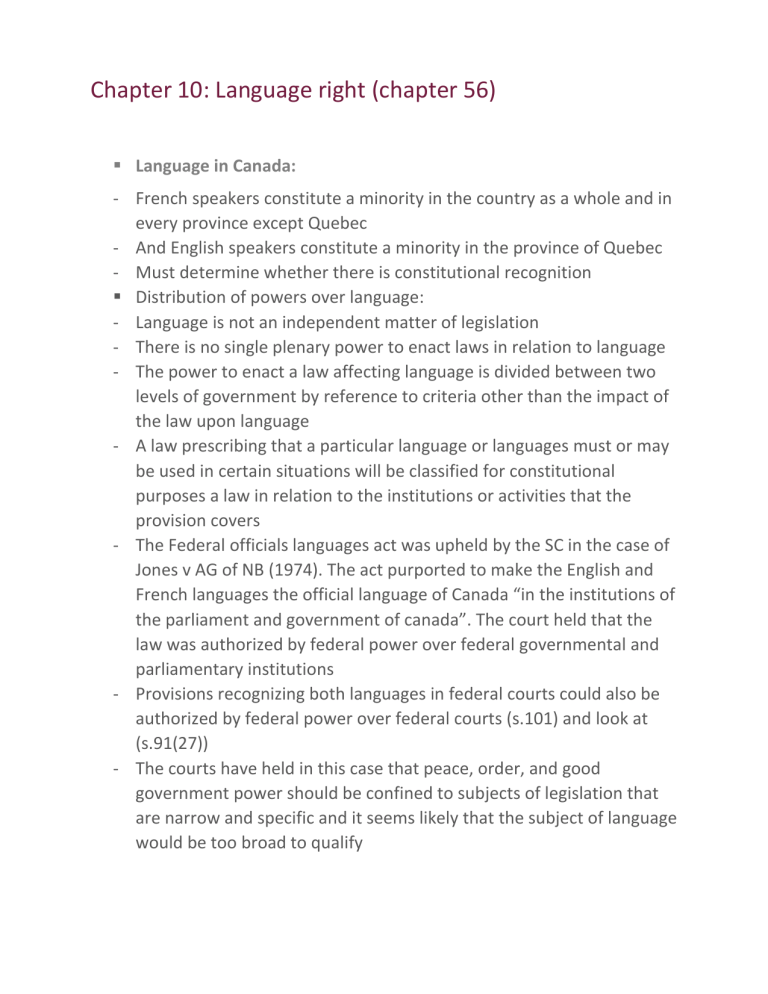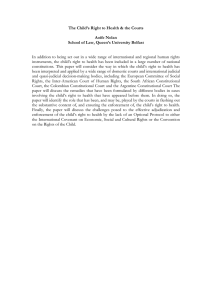
Chapter 10: Language right (chapter 56) Language in Canada: - French speakers constitute a minority in the country as a whole and in every province except Quebec - And English speakers constitute a minority in the province of Quebec - Must determine whether there is constitutional recognition Distribution of powers over language: - Language is not an independent matter of legislation - There is no single plenary power to enact laws in relation to language - The power to enact a law affecting language is divided between two levels of government by reference to criteria other than the impact of the law upon language - A law prescribing that a particular language or languages must or may be used in certain situations will be classified for constitutional purposes a law in relation to the institutions or activities that the provision covers - The Federal officials languages act was upheld by the SC in the case of Jones v AG of NB (1974). The act purported to make the English and French languages the official language of Canada “in the institutions of the parliament and government of canada”. The court held that the law was authorized by federal power over federal governmental and parliamentary institutions - Provisions recognizing both languages in federal courts could also be authorized by federal power over federal courts (s.101) and look at (s.91(27)) - The courts have held in this case that peace, order, and good government power should be confined to subjects of legislation that are narrow and specific and it seems likely that the subject of language would be too broad to qualify - The court in the case Devine v Quebec (1988) accepted for constitutional purposes language is ancillary to the law in relation to the institutions or activities to which the law applies” and this was challenged in provisions were in relation to commerce within the province, which was a matter within the provincial jurisdiction over property and civil rights in the province (s.92(13)) Language of constitution: - The CA 1982 and were enacted by the UK Parliament in both languages - The charter of rights being part I of the CA 1982 is therefore in both languages - Section 57 of the CA 1982 provides that the English and French versions of that act are equally authoritative - And s.56 provides that English and French versions of other parts of the constitution of Canada that have been enacted in English and French are also equally authoritative - The rule is that is most helpful is addressed to the case where one language version is doubtful or ambiguous and the other is clear, in that case the doubt or ambiguity is resolved by reference to the clear version Language of statutes: o Constitutional requirements: - S.133 of the CA 1867 permits either French or English to be used in debated in the house of the federal parliament and Quebec legislatures - It only applies to legislative bodies of the federal government and Quebec - However Manitoba act 1870 includes as s.23 a provision that provides for the use of English and French in the legislature of Manitoba in terms very similar to s.133 - Part I of the CA `1982 INCLUDES SS 16 RO 23 A VARIETY OF LANGUAGE PROVISION o Quebec's charter of the French language: 2 - Quebec created a charter in both English and French but before it was invalid because it was French only o Manitoba’s official language act: - S.23 of the Manitoba act 1870 guarantee the rights of the French speaking minority in Manitoba - Manitoba legislature in 1890 enacted the official language act which provided that the English language only shall be used in the records and journals of the legislatures and in pleading and process in the Manitoba courts. - The Manitoba language act was usually considered unconstitutional - Any mechanisms that attributed superior status to one language version of a statute would violate s.23 o Incorporation by reference: - Where a statute makes a reference to another document so as to incorporate the document as part of the statute then the general rule is that if there is a constitutional requirement that the incorporated statute be in both languages then the requirement will apply to incorporated documents - In the case AG of Quebec v collier the two session papers were unconstitutional because on was in French only. - Remember there can be a bona fide reasons for exempting incorporated document for requirement of bilingual text. ( cases where there is no obligation in the legislative body to provide a bilingual text) o Delegated legislation: - S.133 requirement is that acts be printed and published in both languages applied to delegated legislation as well as statutes - Regulations made by officials or bodies outside the government were subject to s.133 - And regulations that were neither made by the government nor approved by the government were not subject to s.133 3 - Also not subject to s.133 were by laws of local municipalities and school boards even if they were subject to the approval of the government - Another special category was the courts rule of practice these rules although made by the judges not the government were subject to s.133 - The SC Held in Re Manitoba language rights order no 3 (1992) that s.23 only applied to instruments of legislative nature. An instrument would have the following three characteristics (1) it would establish a rule of conduct (2) it would have the force of law and (3) it would be of general application rather than directed at specific individual or situations Language of courts o Constitutional requirement: - Have an option of French or English in a federal court and the court of quebex - Similar requirement for NB and Manitoba - The courts of the other seven provinces do not have this obligation - The language of civil proceedings in the provincial courts is regulated by provinces under s.92(14) - The language in criminal proceeding in the court is regulated by parliament under s.91(27) o Definition of courts: - The reference to the courts of Quebec included not only s.96 courts and the inferior courts, but also administrative tribunals established by statute that exercised adjudicative functions o Language of process: - S.133 where it conferred a choice of language does not guarantee that the speaker writer or issuer of proceedings or processes will be understood in the language of his choice by those he is addressing o Language of proceedings: - In the case of Acadiens the supreme court held that the society had not established their allegation that the judge was incompetent in 4 - - - - - 5 French. However they said that s.19(2) did not in any case confer on French speaking litigant the right to be heard by a judge who understood French They held that the litigants right to use either French or English impliedly included the right to be understood in the litigants language of choice by the judge hearing the case o Right to interpreter: Expressly dealt with by s.14 of the charter of rights as it confers upon a party or witness who does not understand or speak the language of the proceeding or who is dead the right to an interpreter There is a similar right but deadness is not included in s.2(g) of the Canadian bill of rights Under s.14 of the charter a party or witness is entitled to an interpreter if….. S.14 applies to any proceedings which can be criminal or civil and probably includes proceedings before administrative tribunals as well as courts Language of government: o (a) section 16 of the charter: This section makes English and feench the official languages of Canada and new Brunswick And confers equality status and equal rights and privileges as to their use in all institution of parliament and government of Canada o (b) section 20 of the charter Imposes an obligation on government to provide bilingual services to the public In the other 9 provinces there is no constitutional obligation to provide government services in both official languages New Brunswick (ask if this is the only province) Language and commerce: None of the language rights in the constitution of Canada protects the use of the English or French language in commercial (or private ) settings Language of education: o (a) section 93 of the CA 1867: - Applies to Ontario, Quebec, NB, NS, BC and PEI - Legislatures have the power to prescribe the language of instrument of instruction in the schools Mackell case: (look more) - Held that Ontario had the power to require that English be the language of instruction in hitherto French speaking roman catholic separate schools in province - S.93 Section 23 of the charter: - Minority educational rights Mother tongue of parents: (look at lirans notes) - S.23 (1)(a) Where numbers warrant: - The right to minority language education that is conferred on 3 categories of parents that have just been described is not an absolute rights Denominational schools: The courts held that dominantional school rights were not prejudicated they were merely regulated by the vesting of some exclusive powers of management and control In trustees who represented French speaking parents Supervision of remedial orders: - A breach of s.23 may be remedied under s.24 (1) od the charter - 6

